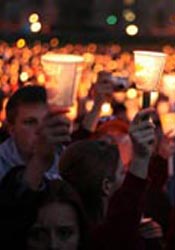Reflections from one Virginia Tech Graduate
 |
|
by Anna Kirsch/PNN I can almost picture myself there; cutting across the well-manicured drill field surrounded by the hazy purple-blue southwest Virginia Mountains. Walking to class and cursing the sharp, icy knife-like wind as it cut into my well-worn brown scarf and tan jacket. A walk I begrudgingly made time and time again to attend my classes at Virginia Tech over three years ago. I spent my university life on the tree-lined streets of the town of Blacksburg. It was the place where I had the privilege, the time and the space to think, to read and to write. The place where I found solace, support and friends. And now the place that will forever by synonymous with April 16th, 2007 and the deadliest shooting rampage in modern history. Today these memories of Virginia I carry with me are haunting, not comforting as they continue to painfully seethe from the corners of my mind to the surface. The gray, almost cobble-stoned buildings, the massive lecture halls, the bright yellow walls of my first apartment off-campus. And now, the breaking news headlines, pictures of candlelight vigils, old photographs of the victims’ faces and video footage of an isolated, desperate, young man. There is no separation between then and now for me and I am acutely aware of my connectedness and familiarity with this place and this tragedy. My memories feel desecrated, bloodstained and tender to touch. I knew those hallways, sidewalks and classrooms in a way most didn’t. I tortured myself by watching the news over and over again. As painful as it was, I couldn’t stop blankly staring as pictures of my old town, school and home were splattered all over the papers, T.V. and radio. I watched because I felt I had to. I watched because I was desperately trying to understand. I watched because I wanted an answer. Watching the tragic events unfold from over 3,000 miles away through the corporate media lens, I began to feel isolated and truly alone. I looked on as different “experts” casually debated the “issues,” gun control, immigration, and campus security less than 24 hours after the killings. Seeing the place and community I had considered home for so long invaded by news cameras and hounding journalists felt like a knife in a fresh wound. The media was once again determined to ignite a debate and bombarded us with forced rhetoric and framed questions. But for me this time it was different, it felt personal. “The media did what they always do,” said Mari, a YouthinMedia journalist for POOR Magazine who is now an organizer in Washington D.C. “They didn’t look at the roots of the real issues and they didn’t listen to the people.” Mari saw this first hand as she watched the Korean community of D.C. become the target for attempted hate crimes, racist remarks and threats. Many Korean people remain scared that they will all be typecast as violent. One Korean woman, a colleague of Mari’s, said soon after the killings “I hope that people won’t think that every Korean person is a killer.” As I flipped the channels and heard over and over again “A Korean man…” I began to wonder why the media was focusing so intensely on the fact that the parents were immigrants, not born in America, as if that made them not part of this country. Was this the media’s way of convincing us that this unspeakable act of violence came from the outside? I watched as fingers were pointed at the campus police and university administrators, and gun sellers and lawmakers, but never once did I hear a serious critique of the mental health crisis in this country or a deep analysis of the race and class struggles that plague so many. I, myself, see these struggles everyday on the streets of San Francisco, watching as so many struggle with racism, classism and disability. This pain, this struggle exists everywhere- even in the hazy mountains surrounding Blacksburg, Virginia. As Rev. Sang Jin Choi, of the Action for Peace through Prayer and Aid (APPA), recently stated, “It is a person’s immoral crime in an immoral society…there are no offenders in an immoral society only victims.” Our pain, our crisis is universal but we are led to believe that it is not, that we are different, a race and class war rages on, false borders separate and we are taught to sympathize, not empathize, disconnect, not to relate to. Selectively grieving, never universally mourning. Anna Kirsch is a graduate of the Race, Poverty and Media Justice Institute at POOR Magazine and is currently working as an assistant teacher and community journalist for POOR/PNN |



